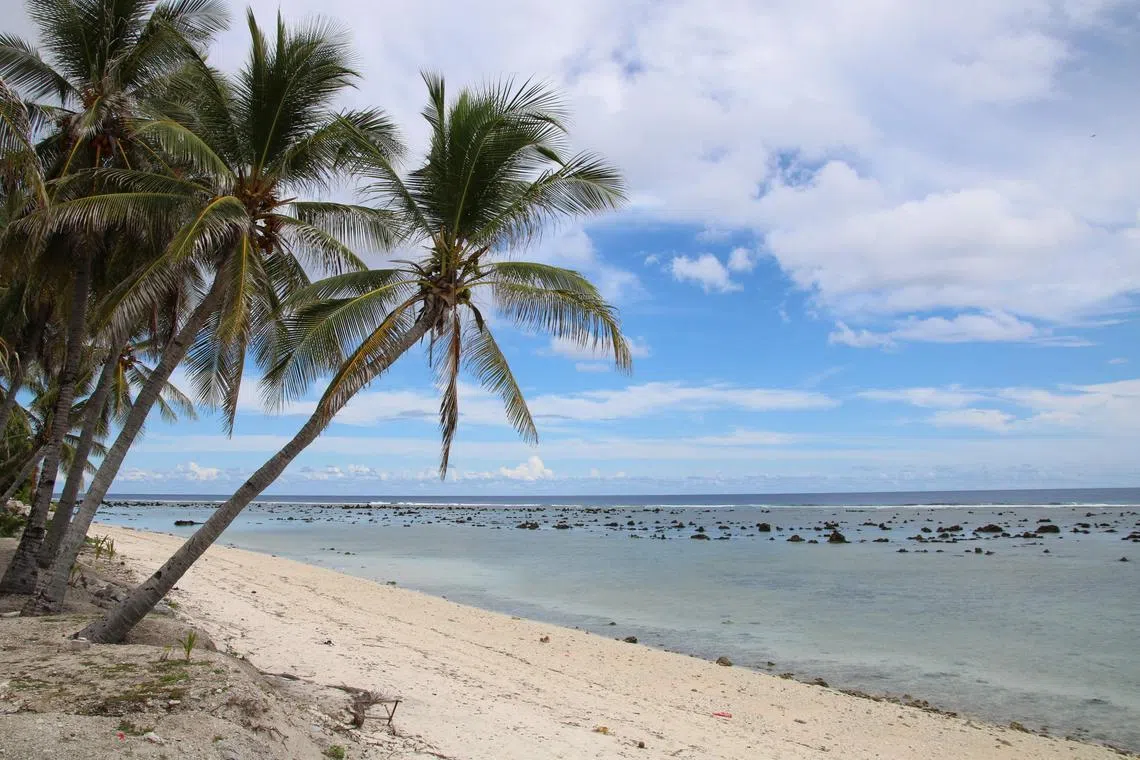Nauru sells citizenship to fund climate change mitigation
Sign up now: Get insights on Asia's fast-moving developments

The island nation of about 13,000 residents is planning a mass inland relocation as creeping seas eat away at its fertile coastal fringe.
PHOTO: AFP
SYDNEY – Pacific microstate Nauru is selling citizenship to fund its retreat from rising seas, President David Adeang told AFP, opening a contentious “golden passport” scheme as other climate financing runs dry.
The low-lying island nation of around 13,000 residents is planning a mass inland relocation as creeping seas start to eat away at its fertile coastal fringe.
It will drum up funding by selling passports to foreigners for US$105,000 (S$140,500) each, despite fears that such schemes are ripe for criminal exploitation.
“For Nauru it is not just about adapting to climate change, but about securing a sustainable and prosperous future for generations to come,” Mr Adeang said.
“This is about more than survival. It is about ensuring future generations have a safe, resilient and sustainable home. We are ready for the journey ahead.”
The island republic sits on a small plateau of phosphate rock in the sparsely populated South Pacific.
With a total land mass of just 21 sq km, it is one of the world’s smallest nations.
Unusually pure phosphate deposits – a key ingredient in fertiliser – once made Nauru one of the wealthiest places, per capita, on the planet.
But these supplies have long dried up, and researchers today estimate 80 per cent of the country has been rendered uninhabitable by mining.
What little land it has left is threatened by encroaching tides – scientists have measured sea levels rising 1.5 times faster than global averages.
Golden passports
Existing climate funding efforts are “not sufficient” to address the challenge, said Mr Edward Clark, who runs Nauru’s new Economic and Climate Resilience Citizenship Programme.
“Debt financing places an undue burden on future generations and there is not enough aid,” he told AFP.
Nauru’s government expects to reap US$5.7 million in the programme’s first year, equating to around 66 successful applications, Mr Clark said.
It hopes this will gradually increase to US$43 million – or about 500 successful applications – which would account for almost 20 per cent of total government revenue.
Nauru officials believe 90 per cent of the population will eventually need to move to higher ground.
The first phase of this mass relocation is estimated to cost more than US$60 million.
To pay the bill, Nauru has pinned its hopes on the new citizenship-by-investment programme.
Mr Clark said it was a kind of “innovation”.
“It is well known that developing climate-vulnerable countries are disproportionately impacted by climate change, and there is therefore an urgent need to ensure they disproportionately benefit from climate innovation,” he said.
Nations such as Nauru “have both a need and a right to be prosperous”, Mr Clark added.
Nauru claims its passport will provide visa-free entry into 89 countries and territories, including the United Kingdom, Ireland, United Arab Emirates and Hong Kong.
A ‘pioneering’ fix?
More than 60 nations offer some form of migration-for-investment schemes, Australia’s Lowy Institute has found.
Pacific nations such as Vanuatu, Samoa and Tonga have all dabbled in selling passports, according to the think-tank.
Pacific regional security expert Henrietta McNeill of the Australian National University said that while these schemes helped bolster government revenue, they were also prone to exploitation.
She said criminals could use these documents to evade law enforcement, launder money or exploit visa-free entry rules.
A previous Nauru attempt to sell passports ended in disaster.
In 2003, Nauru officials sold citizenship to Al-Qaeda members who were later arrested in Asia, according to Australian broadcaster ABC.
Mr Clark said that this time, the nation would offer passports only to like-minded investors who passed “the strictest and most thorough due-diligence procedures”.
“This programme isn’t just about acquiring another passport,” he said. “It’s about joining a community dedicated to pioneering solutions for global challenges.”
Nauru has accepted millions of dollars from the Australian government since 2012 for housing migrants who had sought asylum in Australia.
But the scheme was gradually scaled back following 14 detainee deaths, multiple suicide attempts and at least six referrals to the International Criminal Court.
Nauru still held 87 people as at Aug 31, 2024, according to latest Australian government figures. AFP


